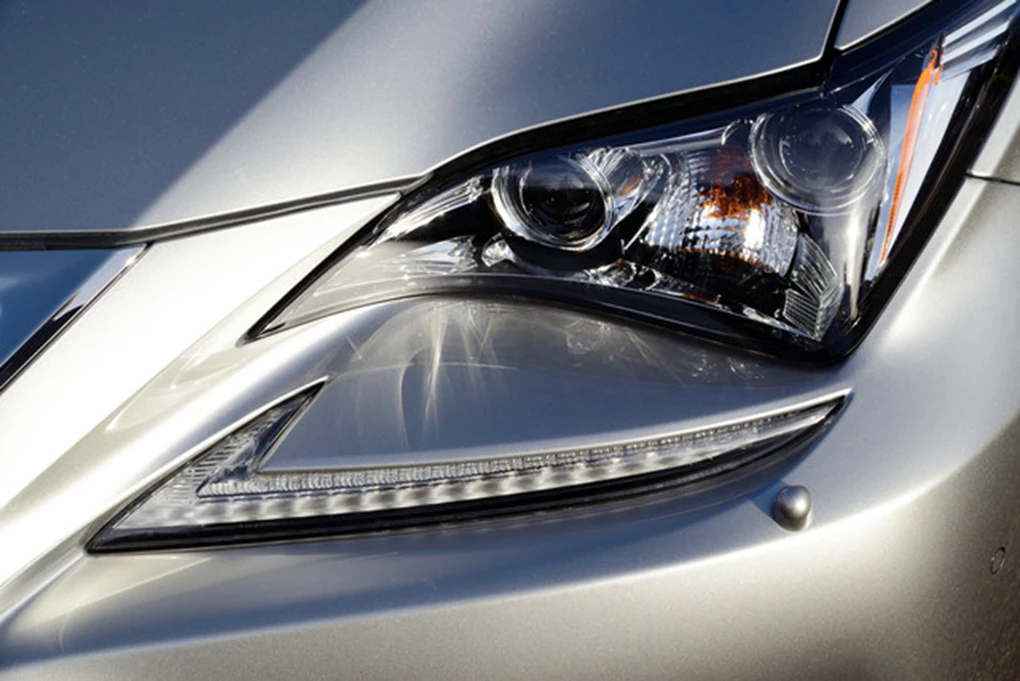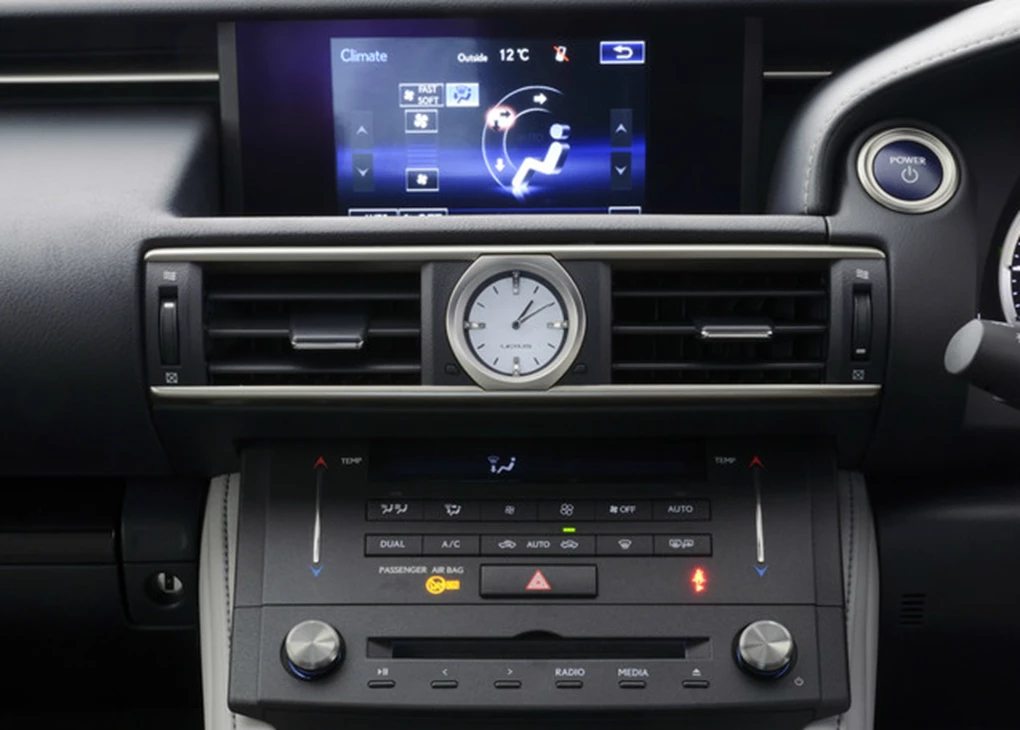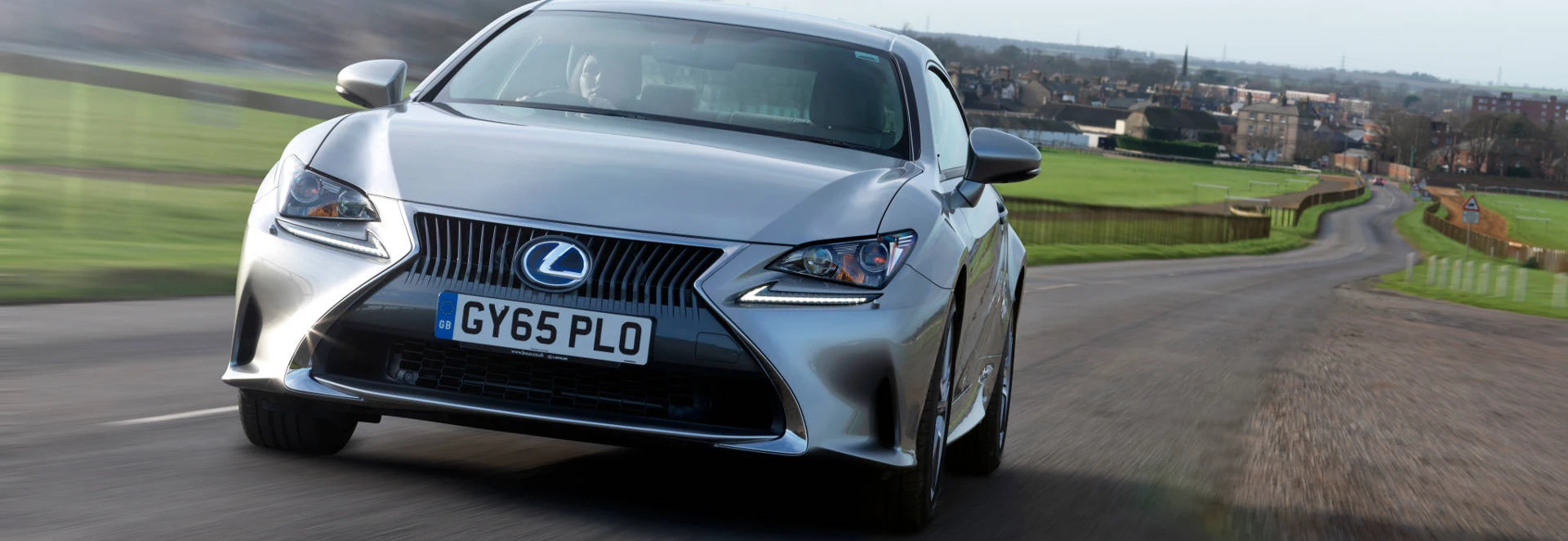The majority of sporty, luxurious coupes out there come in one flavour – fast and expensive to run. But what if there were a more sensible option - something that looked the part but was more conservative when it comes to running costs? Enter the Lexus RC 300h hybrid.
It may not offer the same sporty appeal as its V8 derivative, but the 300h hybrid is a big part of the RC’s appeal, giving executive types a more demure way of getting to those important board meetings.
To say competition is stiff in the coupe sector is stating the blatantly obvious though. German coupes have been roaming this market segment and establishing a rock-solid reputation for quite some time. The four-seat RC on the other hand is Lexus’ first foray into said market – although it isn’t lacking class with an exterior design unlike anything on sale now.
So, can a hybrid coupe newcomer really take sales away from the BMW 4 Series Coupe, Audi A5 Coupe and Mercedes C-Class Coupe?

Performance
Powering the Lexus RC 300h is a 2.5-litre four-cylinder petrol engine, which together with an electric motor produces a total power output of 220bhp. As with many other hybrid powertrains, the RC 300h is centred on using kinetic energy and regenerative braking to recuperate electrical energy, with an on-board battery supplying power for emission-free driving where possible.
This means that when you start the car up you will be in full electric EV mode and be able to simply roll away, free from the noise of a petrol or diesel. Of course, if you put your foot down the petrol engine will take over – but getting used to the 300h’s fuel-saving tendencies is easy. For example, if you accelerate to motorway speeds and then maintain a steady speed, EV mode will actually kick in. You can use stored energy whenever you like with the use of the EV Mode button – but of course this is limited and will be dependent on how much energy is in the battery.
The transition between electric and petrol power is incredibly seamless and will happen without you even noticing – and generally, power delivery in the 300h is smooth and progressive. Gear changes are executed by a CVT automatic gearbox which is excellent in this case, even though CVTs can be a bit temperamental.
The 300h is undoubtedly smooth, but it’s hardly quick. 8.6 seconds to reach 62mph may not seem incredibly slow, but for such a sporty coupe – and when you consider it has 220bhp on tap – it is a little disappointing. Floor it from a standing start and you can feel the weight of the hybrid system acting like cement blocks on the car’s burly frame.
Ride and Handling
Venture onto a country road and again the bulk of its hybrid powertrain can be felt as it drags its weight through bends and seems much more reluctant to change direction than something like a BMW 4 Series Coupe.
The calm and collected hybrid personality of the RC 300h continues to its drive. Alongside its smooth acceleration, the 300h offers a cushy suspension that irons out everything from speed bumps to pot holes, and insulation is top notch, muting even the loudest city centres. The 300h’s favoured habitat though is the motorway. Even at 70mph, the 300h manages to retain its tranquil character, with wind noise and tire roar muted excellently. The driving position of the 300h is great too, with a low-slung driver’s seat that gives a coupe feel without making it feel like you are sat on the tarmac. Similar to its powertrain however, the 300h is more relaxing than fun. Venture onto a country road and again the bulk of its hybrid powertrain can be felt as it drags its weight through bends and seems much more reluctant to change direction than something like a BMW 4 Series Coupe. The steering is lacking feel too which doesn’t help, but it still offers enough responsiveness for effortless manoeuvring around busy streets. There are selectable driving modes to play around with, Sport Mode sharpening up throttle response, Eco Mode softening it up – but you’ll likely just stick with normal mode.

Interior and Equipment
Although the RC offers an efficiency-focused 300h hybrid, it also comes available with a 5.0-litre V8.
A lavish - and often ostentatious - cabin is a must for any large saloon or coupe. Unfortunately, the RC 300h’s interior misses the mark when it comes to German-rivalling luxury. There are plenty of high-quality materials to be had, but the actual design of the cabin seems somewhat of an afterthought. From the centre arm rest to the top of the dashboard, the layout is busy, unimaginative and rather retro. Ergonomically it is fine, but those paying a large premium for luxury and style will want more than that – especially when they look at what German manufacturers are doing. There’s plenty of nifty gadgets and trinkets on offer though, with electrically-adjustable leather and heated seats, LED ambient lighting, an information-heavy instrument cluster behind the steering wheel and a seven-inch infotainment screen with sat-nav and DAB radio, which is controlled via a touchpad in the centre console. This touchpad certainly takes a bit of getting used to as it comes with a strange vibrating feel – this can be disabled - and an audible click. Being a coupe, practicality isn’t the RC’s forte. Up front the door bins are very small and incapable of holding even an average-sized bottle of water, and the glovebox is tiny. Rear passengers, especially adults, won’t want to be travelling long distances in the RC as head room in particular is extremely limited and leg room is minimal too. As there are only two seats in the rear, elbow room is plentiful, although between the two rear passengers sits a rather unusual, and quite frankly useless, plastic tray. Like many other sporty coupes, the boot of the RC actually offers a decent amount of storage space, but it is difficult to get at it due to the limited access of the boot opening. The 300h hybrid model also has slightly less storage space than the standard RC, at 340 litres, which is about the same size as an average hatchback.
Cost
The decider however may likely come down to list price, with the Lexus RC 300h starting from £37,145.
The RC 300h has a glowing scorecard when it comes to efficiency and running costs, with CO2 of just 113g/km and an average return of around 45-50mpg, Lexus claims 57.6mpg. The decider however may likely come down to list price, with the Lexus RC 300h starting from £37,145 – that’s considerably more expensive than the £32,500 BMW 4 Series Coupe and £31,000 Audi A5 Coupe.
Our Verdict
Regardless of price, interior panache and fun behind the wheel, those who want a Lexus will likely just compromise and be happy to do so. Similar to those who are buying something like a Jaguar, they’re not buying it because it’s perfect, they are buying it because they want to be different. It’s more than just a pretty face though. The Lexus RC 300h offers hybrid efficiency and one of the most serene driving experiences that money can buy. And did we mention how good it looks?




